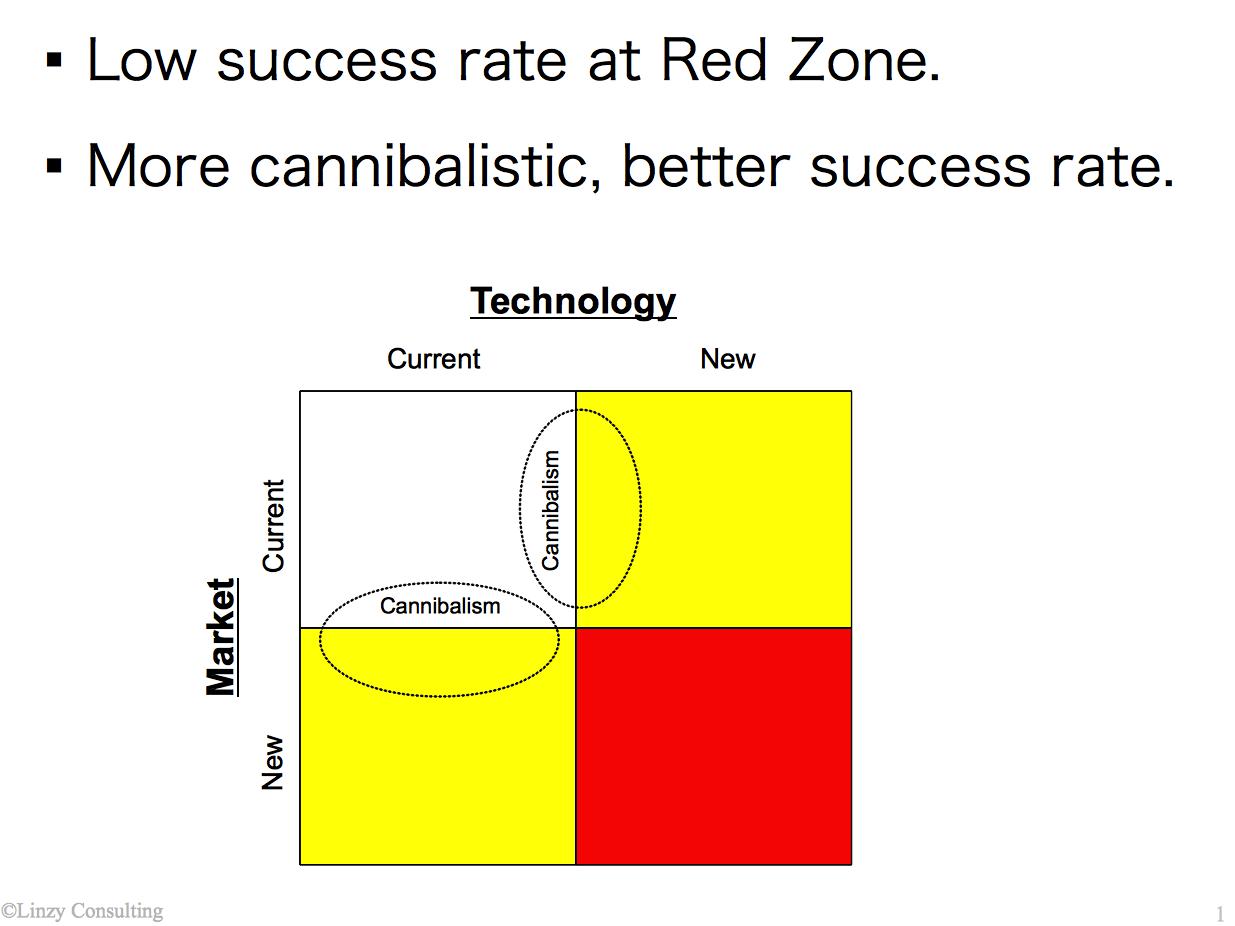Corporate venture: 1 Win 9 Losses Means a Winner
Hello. This is Irino, a strategy consultant.
Starting new business from big companies is different from starting an independent startup from scratch. I’ll explain about corprate venture today.
There are four goals in starting a new business.
- Goal 1: Make money
- Goal 2: Expand your business domain
- Goal 3: Develop entrepreneurial corporate culture
- Goal 4: Nurture leaders of the next generation
Goal 1 and 2 are hardly achievable. It’s higly possible that you may lose money or cannot keep the new business domain sustainable.
Success rate of new business is very low. Here’s a stats; Deal flow of a big venture capital in Japan.
| Phase | # of Companies | Rate |
| Phonecall or Meeting | 12,000 | 100% |
| Due deligence | 400 | 4% |
| Investment | 90 | 0.7% |
| IPO/Buyout | 30 | 0.3% |
There’s a saying in Japan like “Three out of a thousand.” That happens to be true in reality.
Goal 3 sometime has the opposite effect. Some companies learn to be more conservative after a few failures.
Goal 4 is the only goal that is achievable for sure. Project members will learn and grow rapidly, even if their business doesn’t go well. New business is worth trying, merely because you happen to train a future CEO.
A great idea often loses its edge in large enterprises when a beurocratic smart-ass points out the existence of weakness. But improving strengths is far more important than eliminating weaknesses. Voice of customers are far more important than voice of employees. Hide your new project from bureaucrats at incubation stage.
Some people fear dog-eat-dog cannibalism and try to enter a business domain which is too far from their current business domain.
Refer to the matrix below. Success rate in the red zone is statisticly very low. Yellow zone is still risky. Aim at the somewhere between yellow and white zone.
The closer you are to “current market x current technology”, the higher your success rate becomes. Don’t be afraid of cannibalism too much. Rather, try to eat your own existing business. Otherwise, your competitiors will eat you in the future anyways. General Electrics CEO Jack Welch, the master of portfolio management, was right when he ordered his team to make an “anti-something department” to challenge his own company.
You cannot make money no matter how much time you spend on meetings and reports for in-house budget. One of the few advantages corporate ventures have over independent startups is that corporate ventures have the financial backup from their parent companies. Intrepreneurs are not supposed to waste their time on fund-raising. Time is the most precious resource, but it is equally distributed to big companeis and small companies. It’s a shame if corporate ventures is slowed down by their parent companies.
Large companies are short of talents with entrepreneurship. Their recruiting process is very optimized at recruiting talents for their current business, not for new business. So, some clever companies are not shy from counting on external talents. For example:
- They hire experienced professionals from venture capitals and startups.
- They hire a person with a wide network of contacts.
- Their CIO hosts meetings for getting proposals from IT startups.
- They dare to propose joint venture with their competitors.
- They invest in private equity funds to gather information.
- They sponsor business plan contests.
In terms of financial impact, decision to kill a project is more important than to start a project. It’s difficult for a new business to earn gross margin of 2 million dollar. But it’s easy to lose 2 million dollar if you drag along a living-dead project.
A project is harder to end than to start. Failure is labeled as a shame, not as an experience. Entrereprenurs are too passionate to accept failure. They are fighters, not quiters.
But be proud of quitting your project if quitting is a reasonable decision. If the fighter cannot give up by himself, other peopel should toss him a towel. It’s hard to quit a project because he is at a loss what to do next. Create a new project for him. Drop him from the living-dead project. Assign him to the new project. Otherwise, he will quit your company after all the learing and growth experience. Remember the Goal no.4.
There are many criteria on who should join your venture project. But make sure you pick the one who raised hand, because he keeps motivated under in-company pressure. Don’t worry too much about skills and experience. Nobody isn’t a perfect match in your company anyways.
In successful projects, there happens to be a guardian angel who:
- Has a track record of successful new busiess as one of founders’ generation.
- Shuts up smart-ass bureaucrats with his charisma, not with logic.
- Pretends not to notice a submarine project.
- Believes new venture as corporate culture.

People often say that venture businesse must be having hard time in such a recession, but I don’t think so. It’s a matter of fluctuation. As long as change happens, there is opportunities for new business. Upward change is preferrable. But downward change is not so bad as long as it fluctuates to some extent.
That’s it for today.
Irino
- A celebrity entrepreneur
- A managing director in a listed company
- A professor
- A rocket scientist
Looking forward to working with excellent leaders.
Please contact:
iphone: 090-6497-4240
irino@linzylinzy.com (Irino)
- One-two finish in the largest business plan contest in Japan
- One-two finish in Asian Entrepreneurship Award
- No.1 in google "business plan"
- Judge in the Cloud-Computing Awards
- Write/Review +100 business plans a year
- Meet +300 entrepreneurs a year
- Large-scale project management
e.g. +15,000 man-months post merger integration - Expertise: business planning, financing, IT, project management
- Fortune Global 500 companies:
bank, brokerage, card, SIer, etc - Startups:
IT, cloud, bio, cosmetics, minor metals, aerospace, etc - Tokyo University -> University of British Columbia -> Oracle -> Headstrong -> Independent




